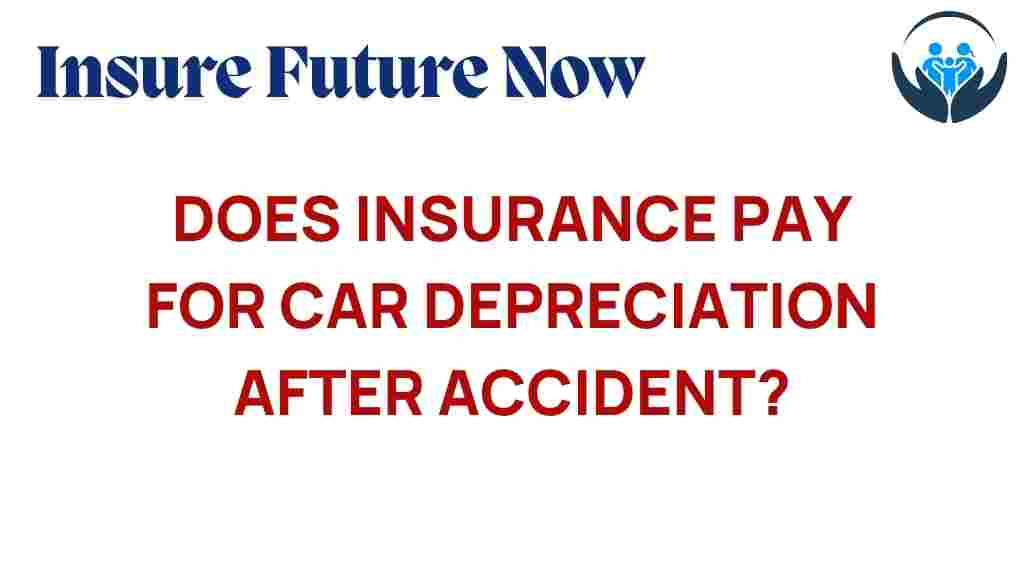Unraveling the Mystery: Does Insurance Cover Car Depreciation After an Accident?
When it comes to auto insurance, many drivers are often left wondering about the nuances of coverage and how it affects their vehicle’s value after an accident. A common concern is whether insurance covers car depreciation following an accident. Understanding this aspect of insurance can help you navigate the complexities of accident claims and ensure you have adequate financial protection.
Understanding Car Depreciation
Before diving into whether insurance covers car depreciation, it’s essential to understand what car depreciation is. Car depreciation refers to the reduction in a vehicle’s value over time, influenced by various factors such as:
- Age of the vehicle
- Mileage
- Condition (both mechanical and cosmetic)
- Market demand for that particular make and model
On average, a new car loses about 20% of its value within the first year and approximately 10% each subsequent year. This decline in value is crucial when considering insurance payouts after an accident.
Does Insurance Cover Car Depreciation?
The short answer is: it depends on your auto insurance policy details. Most standard auto insurance policies do not directly cover car depreciation. Instead, they typically provide coverage based on the vehicle’s value at the time of the accident, which can be significantly lower than the purchase price due to normal depreciation.
Types of Coverage That May Be Relevant
To understand how insurance interacts with car depreciation, let’s explore the various types of coverage that may come into play:
- Liability Coverage: Covers damages to other vehicles and medical expenses for injuries to others if you are at fault in an accident. It does not cover your own vehicle’s depreciation.
- Collision Coverage: Pays for damage to your vehicle after an accident, regardless of fault. However, it will typically only pay you the car’s market value at the time of the accident, not the pre-accident purchase price.
- Comprehensive Coverage: Covers damage from non-collision incidents (like theft or natural disasters), similar to collision coverage regarding the market value payout.
- Gap Insurance: If you owe more on your car loan than its current market value, gap insurance can cover the difference, which can be particularly beneficial after an accident.
How Insurance Payouts Work After an Accident
When you file an accident claim, the insurance company will assess the damages and determine the vehicle’s current market value. Here’s a step-by-step process of what typically occurs:
- Report the Accident: Contact your insurance company immediately after an accident to report the incident.
- Assess Damage: An adjuster will evaluate the damage to your vehicle and may also consider its depreciation.
- Determine the Payout: The insurance company will calculate the payout based on the vehicle’s current market value, factoring in depreciation.
- Receive Compensation: Once the payout is established, you will receive compensation, which may not cover the full cost of repairs or replacement due to depreciation.
Understanding this process helps clarify why many car owners feel shortchanged after an accident. The depreciation of vehicle value can lead to payouts that do not fully reflect the investment made in the vehicle.
Financial Protection: The Importance of Policy Details
To ensure maximum financial protection, it’s vital to review your auto insurance policy details regularly. Consider the following:
- Coverage Types: Ensure you have the right combination of coverage, including collision and comprehensive.
- Limits of Liability: Check your liability limits to ensure they are adequate in case of serious accidents.
- Gap Insurance: If you have a loan on your vehicle, consider adding gap insurance to protect against depreciation.
- Deductibles: Understand your deductibles as they will affect your out-of-pocket expenses during a claim.
Tips for Handling Depreciation in Accident Claims
While you cannot prevent depreciation from affecting your insurance payouts, there are steps you can take to mitigate its impact:
- Keep Records: Maintain detailed records of your vehicle’s maintenance, upgrades, and repairs. This documentation can help establish your car’s value.
- Get Multiple Estimates: After an accident, obtain multiple repair estimates to present to your insurance company.
- Negotiate: Don’t hesitate to negotiate your insurance payout if you believe the initial offer does not reflect your vehicle’s true value.
- Consider a Professional Appraisal: If you feel your vehicle’s value has been underestimated, a professional appraisal can provide leverage in negotiations.
Common Misconceptions About Car Depreciation and Insurance
There are several misconceptions surrounding the relationship between insurance and car depreciation. Let’s address a few:
- Myth: Insurance pays for all damages without considering depreciation.
Reality: Insurance payouts are based on the vehicle’s market value, which accounts for depreciation. - Myth: All insurance policies cover depreciation.
Reality: Most standard auto policies do not cover depreciation directly, but specialized policies may. - Myth: You can claim the full purchase price of your vehicle.
Reality: Insurance will only cover the current market value, not the original purchase price.
Conclusion
In conclusion, understanding how insurance interacts with car depreciation after an accident is crucial for every vehicle owner. While standard auto insurance does not cover depreciation directly, knowing your policy details can help you make informed decisions during accident claims. By taking proactive steps, such as obtaining gap insurance and keeping thorough documentation, you can better protect your financial interests and ensure a smoother recovery process after an accident.
For more details on how to enhance your auto insurance coverage, visit this comprehensive guide.
For further reading on insurance policies and vehicle value assessments, check out this informative resource.
This article is in the category Claims and created by InsureFutureNow Team
